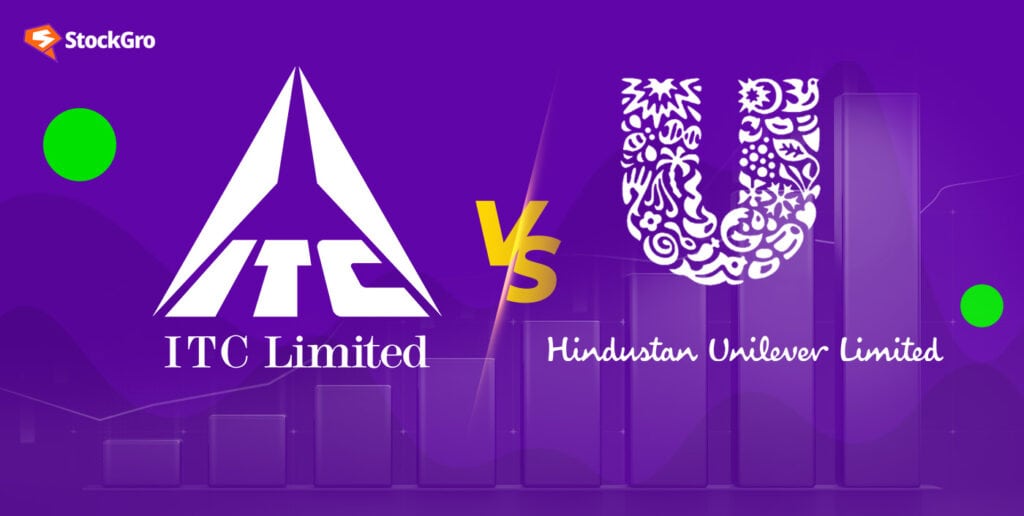
Have you noticed that FMCG (Fast Moving Consumer Goods) stock prices are usually stable, irrespective of the market condition? Since FMCG consists of products required for daily needs, the demand for such stocks stays constant. Hence, most investors consider FMCG stocks as safe havens during economic downturns and prefer holding some of them in their portfolios at all times.
Today’s article compares the two popular FMCG stocks – ITC and HUL. Read further to explore which stock fits your portfolio better.
Also read: Fast-Moving Consumer Goods (FMCG) Sector- A Safe Haven in Bear Markets?
ITC
Imperial Tobacco Company, now ITC Limited, is an Indian conglomerate headquartered in Kolkata, India. The company was established in 1910 and stands as one of the top public limited companies in India.
It has business across various sectors, including FMCG (Fast Moving Consumer Goods), hotels, packaging, stationary, information technology, and more. ITC’s FMCG range includes famous brands like Sunfeast, Aashirvaad, Classmate, etc. The firm’s hospitality works under the brand ‘ITC Hotels’, offering luxury services. ITC’s market share in FMCG is significant, especially in the tobacco market.
The company is listed on the National Stock Exchange (NSE) and the Bombay Stock Exchange (BSE). ITC’s share price today is ₹410.70 on NSE and ₹410.55 on BSE.
HUL
Hindustan Unilever Limited, popularly known as HUL, is the subsidiary of the British multinational – Unilever. HUL’s market share in FMCG is the highest, making it the largest FMCG brand in the country.
The Indian wing was established as Hindustan Vanaspati Manufacturing Co. in 1931. The company was renamed as Hindustan Unilever Limited in 2007. The firm has a vast portfolio of products, including items under home and personal care, food and beverages, water purifiers, etc. Dove, Lux, Surf Excel, Rin, Lifebuoy, Knorr, etc., are some popular household brands owned by HUL.
Despite some controversies, HUL’s products have been the preferred choice of goods in many households, making HUL retain its top position in the FMCG space.
The company is listed on the National Stock Exchange (NSE) and the Bombay Stock Exchange (BSE). It is currently trading at ₹2,392.45 on NSE and ₹2,391.25 on BSE.
Financials
| Financial metric | ITC | HUL |
| Revenue from operations as of 2023 (In ₹ cr) | ₹69,480.89 | ₹58,154.00 |
| Net profit as of 2023 (In ₹ cr) | ₹18,753.31 | ₹9,962.00 |
| Basic EPS (In ₹) | ₹15.09 | ₹42.40 |
| Dividend per share as of March 2023 (In ₹) | ₹15.50 | ₹39 |
| Return on Net Worth (%) | 28.05% | 19.83% |
| Total assets (In ₹ cr) | ₹67,598.34 | ₹71,825.00 |
| P/E Ratio | 25.06 | 54.53 |
| Dividend yield | 3.16% | 1.67% |
| Market capitalisation | ₹5.14 trillion | ₹5.63 trillion |
Pros and cons of investing in ITC
Benefits of investing in ITC:
- ITC’s product range is diverse, due to which investors get exposure to different industries.
- ITC has been prompt in the payment of dividends to its shareholders in the past, making this an attractive option for investors wanting stability.
- ITC has a strong presence and market share in the FMCG space with household brands like Sunfeast and Aashirvaad.
- ITC’s revenues have been on the rise for the last five years, thanks to its extensive distribution network through which the brand has consumers across the country.
- ITC is well known for its sustainable practices, which makes it a good buy for investors looking to contribute to social causes.
Also read: Ethical dilemma of taxing alcohol and cigarettes
Watch out for the following:
- A significant portion of ITC’s revenue comes from its tobacco business. Consumer preferences, regulatory measures and heavy reliance on tobacco can affect the revenue negatively during unfavourable events.
- The number of new companies entering the FMCG sector is increasing, besides the well-established ones, making the space highly competitive.
- ITC’s business, especially in the hospitality sector, is capital-intensive. Hence, a significant portion of profits may have to be invested back into the business, reducing the profits available for shareholders.
Pros and cons of investing in HUL
Benefits of investing in HUL:
- Hindustan Unilever is a market leader in its sector. Given its size and network, the company has been able to cater to the needs of urban and rural populations. Due to this, it continues to hold a significant place in households and the FMCG market.
- HUL has a diverse product portfolio, which contributes heavily to maintaining the company’s stability when one product range takes a hit.
- HUL’s YoY revenue and profits are on the rise. It is also consistent in paying dividends to shareholders.
Watch out for the following:
- Both ITC and HUL operate in the FMCG space. Apart from being competitors to each other, HUL, similar to ITC, faces heavy competition from other market players.
- HUL’s business is actively involved in food, beverage, cosmetics etc., that can impact the consumer’s health positively or negatively, depending on the product’s quality. HUL has faced criticisms in the past due to low-quality raw materials used in its food and cosmetics.
- HUL is a subsidiary of Unilever. Any downturn in Unilever can affect HUL’s operations to a large extent.
Which stock is better among the two?
- YTD performance of stocks: ITC’s share price has fallen about 12% from ₹468 to ₹409, considering YTD data. HUL’s share price has fallen by about 9.6% from ₹2,645 to ₹2,397.
- One year’s performance of stocks: ITC share rates have gone up by 7% in the last 12 months from ₹376.70 to ₹409. HUL’s stocks have fallen by about 3% in the last 12 months from ₹2,460.25 to ₹2,397.
- 52-week high: ITC’s shares hit its 52-week high of ₹499 in July 2023. The current share price is significantly lower. HUL’s 52-week high was in July 2023, too, at ₹2,769. HUL’s decline has been steep, as well.
- The long-term perspective: Both ITC and HUL have considerably gained over the last five years. While ITC has gained about 47%, HUL’s share price history shows a 38% gain from 2019.
In summary, both stocks have underperformed in the recent past. However, with respect to operations, both companies have been profitable consistently.
Here are some opinions of industry experts about the two FMCG giants:
- Some consider HUL a better buy since it holds a significant position across different segments. While ITC has tobacco restrictions, which can be a major hurdle in the company’s operations, HUL is free of such obstacles, making it a preferred choice.
- ITC’s prominent shareholder BAT is trying to liquidate its stake in the company, which may affect ITC’s shares negatively. There are also talks about ITC’s hotel segment demerging from the business for a separate listing. So, ITC Hotel’s share price will be independent, making the current scenario for ITC unstable.
- However, a certain section of industry leaders choose ITC over HUL, since it is an Indian brand contributing to the growth of the country.
Also read: Economics of the tourism and hospitality industry in India
Bottomline
ITC and HUL have their respective ups and downs. The decision of which stock to invest in purely depends on the investor’s objective and risk appetite.
HUL’s market share and P/E ratio are higher, suggesting a stable income opportunity, however, the growth is limited. For those looking at higher dividend yields, ITC might be more appealing. Hence, assess your goals and choose wisely!

